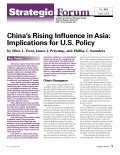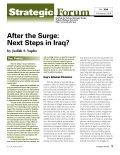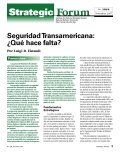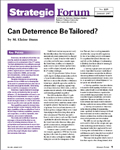WELCOME TO THE
INSTITUTE FOR NATIONAL STRATEGIC STUDIES
INSS - IISS Joint Conference
New Approaches to International Security: Reassessing the US Role in the
World

Supported by the Institute for National Strategic Studies and International Institute for Strategic Studies, academics, senior leaders
and other critical policy thinkers from 15 nations gathered at the Rockefeller Foundation estate in Bellagio, Italy to reassess America's
security role in the world in the coming years. Dr. Patrick Cronin, director, INSS, led the five day conference, “New Approaches to International
Security: Reassessing the U.S. Role in the World”, which yielded wide-ranging discussions from a diverse, international perspective.
Participants included Admiral Giampaolo Di Paola, chairman-elect of the NATO military committee; Ambassador Zakram Amir, Additional Secretary of
the Prime Minister’s Secretariat, Pakistan; MG Ton van Loon, former ISAF commander in southern Afghanista; and Ambassador Richard Roth, Senior
Vice President, National Defense University. The project, jointly conducted by INSS and IISS, is in support of a written study to be produced by
Dr. Cronin, later this year.
2008 Joint Operations Symposium
Strategic Reassessment: From Long Range Planning to Future Strategy and
Forces
|

 |
|
 |
The conference began with an examination of the
complexity
and necessity of strategic assessments and recognition of
our continuing limitations in long-range future forecasts.
Frequently mentioned as key elements of success were: the
importance of adaptive strategies, recognition that our
adversaries and the strategic environment are not static,
necessitating a constant cycle of re-assessment,
engagement of key stakeholders, and incorporation of
lessons learned.
The symposium also
explored competing
strategic visions for America’s future, the application of
strategy to plans and forces, and the need to leverage the
Interagency community, private sector, and international
allies and partners in strategic assessment and planning
processes. Participants described the complexity and the
interconnectivity of current and looming challenges and threats,
including the
rise of China, global insurgency, nuclear proliferation,
and
climate change. The daunting security environment also
makes it essential that the next Administration act quickly to
develop a grand strategy, along with the requisite
prioritization of issues and allocation of resources.
Speakers included: (clockwise from top left)
GEN James Mattis, the Honorable Ryan Henry,
ADM James Stavridis, Ms Michele Flourney,
Dr. James Corum, Dr. Kurt Campbell, and Dr. Kori Schake. |

 |
| |

 |
|
|
STRATEGIC POLICY STUDIES |
| GLOBAL DEFENSE STRATEGY, PLANNING & REQUIREMENTS |
|
|
|
|
The Global Defense Strategy, Planning and Requirements team examines challenges arising in the
formulation and conduct of U.S. national security policy and defense strategy. The Institute for National Strategic Studies has been collaborating with the
Project on National Security Reform since late 2006. The project is a non-partisan initiative sponsored by the Center for the Study of the Presidency and
dedicated to reforms that will resolve the long-standing inability of the United States government to integrate effectively all elements of national power
in pursuit of national security. Toward this end, the project includes a rigorous study of the interagency process that is modeled on the historic
Goldwater-Nichols legislation that helped transform the American military and its unprecedented world-class capability for joint warfare. This presumptive
study objectives are recommendations on: (1) changing the sixty-year-old National Security Act; (2) presidential directives to implement other reforms; and
(3) new Congressional committee structure and practice. For more information on the project, visit www.pnsr.org.
INSS hosted a special book seminar on Thursday September 20, 2007--"Increasing SOF's Strategic Value." The seminar included
two panels, the first featuring authors Dr. Chris Lamb, INSS Senior Fellow and Dr. David Tucker, Associate Professor at the Naval Postgraduate School.
The second panel included commentary on the book and questions from the audience to the panel featuring the Honorable Jim Locher of the Project on
National Security Reform; Retired Special Operations Forces officers Major General Geoffrey Lambert and Colonel David McCracken; and Colonel Kevin
McDonnell, Director of the USSOCOM Washington Office. Click on one of the titles below to view the slide presentations given by
panelists:
Selected Output:
U.S. Special Operations Forces, with David Tucker, forthcoming from Columbia University Press in August 2007.
“The U.S. Country Team: Restructuring America’s First Line of Engagement,” by Robert B. Oakley and Michael Casey, Jr, Strategic Forum No. 227, Institute for National Strategic Studies, National Defense University, forthcoming in July 2007.
“Reforming Pentagon Strategic Decision Making,” by Christopher J. Lamb and Irving Lachow, Strategic Forum No. 221, Institute for National Strategic Studies, National Defense University, July 2006.
“Restructuring Special Operations Forces for Emerging Threats,” by David Tucker and Christopher J. Lamb, Strategic Forum No. 219, Institute for National Strategic Studies, National Defense University, January 2006.
"Review of Psychological Operations Lessons Learned from Recent Operational Experience," by Christopher J. Lamb, September 2005.
"Transforming Defense," by Christopher J. Lamb, September 2005.
“ Insurgency: Modern Warfare Evolves into a Fourth Generation,” by T.X. Hammes, Strategic Forum No. 214, Institute for National Strategic Studies, National Defense University, January 2005.
Click for Global Defense Strategy, Planning & Requirements reports:
Key Staff: Elaine Bunn, Christopher Lamb, Jim Murtha, Robert Oakley
Click here to visit the INSS Research Directorate page for related studies.
Click here to visit the NDU Press home page to view other related publications.
|
|
| FUTURE STRATEGIC CONCEPTS |
|
The Future Strategic Concepts Program explores the development, organization, and employment of U.S.
strategic capabilities for deterring, dissuading or defeating threats.
Selected Output:
“Spacepower in the 21st Century,” by Charles D. Lutes, in Joint Forces Quarterly, Issue 49, 2nd Quarter 2008.
“Dissuasion and the War on Terror: What is Meant by Dissuasion, and How Might it Apply to the War on Terror?” by M. Elaine Bunn and Charles D. Lutes, chapter in Five Dimensions of Homeland and International Security, Esther Brimmer, Editor, Center for Transatlantic Relations, The Johns Hopkins University, 2008.
"The Emerging Global Security Environment," by Charles D. Lutes, M. Elaine Bunn and Stephen A. Flanagan. in Strategic Challenges: America’s Global Security Agenda, Stephen J. Flanagan and James A. Schear, Editors, National Defense University Press and Potomac Books, 2008.
"Can Deterrence Be Tailored?" by M. Elaine Bunn, Strategic Forum 225, Institute for National Strategic Studies, National Defense University, Jan. 2007.
“Russia’s Cold War Perspective on Missile Defense in Europe,” by John P. Caves Jr. and M. Elaine Bunn, published 3 May 2007 on the website of Fondation pour la Recherche Stratégique.
Key Staff: Elaine Bunn, Michael Hughes
|
|
| TERRORISM, TRANSNATIONAL THREATS & HOMELAND SECURITY |
|
|
CTNSP / INSS Special Report: Transatlantic Homeland Defense
This report is a joint project of the Center for Technology and National Security Policy and the Institute for National Strategic Studies
at National Defense University. It was prepared by Neyla Arnas, Hans Binnendijk, Stephen J. Flanagan, Stuart E. Johnson, Richard L. Kugler, Leo G. Michel,
Anne M. Moisan, Jeffrey Simon, and Kimberley L. Thachuk.
Excerpt: "NATO plays an essential role in defense of the transatlantic homeland from terrorism and other transnational threats, but it could do more,
including in support of national, European Union, and Partner efforts to enhance societal security. This paper proposes an initiative to
enhance NATO’s planning and capabilities in this area at the Alliance’s November 2006 Riga Summit. This back-to-basics approach is designed
to ensure that NATO can deal effectively with new threats to the transatlantic homeland. It would also enhance NATO’s relevance in the eyes
of the public on both sides of the Atlantic."
|
|
|
| REGIONAL SECURITY STUDIES |
|
France and NATO: Getting to “Oui”
by Leo Michel
In a commentary published by the journal of the German Council on Foreign Relations, Internationale Politik, INSS Senior Research Fellow
Leo Michel offers his perspective on ways to increase French participation in NATO.
President Sarkozy seeks a rapprochement with NATO while strengthening the European Union’s defense dimension. France’s allies,
including the United States and Germany, have welcomed this. But Sarkozy faces strong domestic resistance to changing France’s relationship to NATO.
Russian Foreign Policy beyond Putin
by Eugene Rumer
Russia clearly has rebounded from its post-Soviet period of decline and is now seeking a place in world affairs commensurate with its size, history,
and self-image. But is the expansive vision of Russia's leaders and people consistent with the resources realistically available to them over the long run?
What are the critical factors driving Moscow's behavior in the economic, political and security spheres? Are fears of a new Cold War realistic?
What options are available to Western policymakers in responding to a resurgent Russia? INSS Senior Fellow Eugene Rumer examines these and related
questions in his new study, Russian
Foreign Policy Beyond Putin, recently published by the International Institute for Strategic Studies in London as part of its prestigious Adelphi
Papers series.
Central Asia: Views from Washington, Moscow and Beijing by Eugene Rumer et al.
Despite their impact on some of the most pressing issues facing American policymakers today, developing a coherent and effective strategy toward the
Central Asian republics of the former USSR continues to prove a daunting challenge. The United States has a number of key interests at stake in Central
Asia, ranging from the war on terrorism and democracy promotion to energy security and counterproliferation. At the same time, these five countries at
the heart of the Eurasian landmass are also the potential focal point for a destabilizing competition between the U.S. and the panoply of rising and
resurgent powers surrounding them. In
Central Asia:
Views from Washington, Moscow, and Beijing, INSS Senior Fellow Eugene Rumer and his Russian and Chinese co-authors consider how Central Asia's
fragile political and security equilibrium would be affected by competition or cooperation among the major outside powers.
7 OCTOBER 2007 PRESENTATION
BY LEO MICHEL
NATO-EU CO-OPERATION IN OPERATIONS:
CHALLENGES AND OPPORTUNITIES
Some NATO-EU tensions likely are inevitable, as the organizations are different and national political calculations will come into
play in any specific case. But with better tools in place to cooperate, the chances of an effective response will increase if and when
the political will exists to do so.
Sarko’s Window of Opportunity
France’s NATO equities--measured in force contributions to its operations, military representation in its structure, and budget
shares--far exceed its concrete investments in the EU’s European Security and Defense Policy (ESDP), but the latter enjoys pride
of place in French political discourse. See Leo Michel's recent commentary in
European Voice, a Brussels weekly newspaper dedicated
to European Union issues.
What Place For France in NATO?
Will the new French President, Nicolas Sarkozy, follow his predecessor's policies regarding NATO and European defense or reshape
France's approach in ways that strengthen both Europe and transatlantic relations? Read Senior Research Fellow Leo Michel's opinion
piece published by Le Monde, a leading French newspaper, on June 5, 2007. Both
French
and
English
versions are available.
Transatlantic Relations and Radical Novelties in the 21st Century
On 14-15 May 2007, the NATO Defense College (NDC), Institute for National Strategic Studies (INSS), and the German Council on Foreign
Relations (DGAP) jointly organized a seminar at NDC (Rome) to explore "Transatlantic Relations and Radical Novelties in the 21st
century." The seminar, conducted under "Chatham House Rules," addressed recent political developments in selected Allied countries
and longer-term challenges (including demographic changes, the changing nature of warfare, and various impacts of "globalization")
and their implications for the Atlantic Alliance. Seminar participants were officials from NATO Headquarters, Allied Command
Transformation, Allied Command Operations, and experts from NATO nations, including INSS Director Dr. Stephen Flanagan and Senior
Research Fellows Dr. Jeffrey Simon and Mr. Leo Michel. Here are the links for for a
summary of the general findings
of the seminar and
"scope papers"
outlining the principal issues.
NATO’s “French Connection”: Plus ça change…?
by Leo Michel
Will the next French president’s NATO agenda differ from his or her predecessor’s? The ongoing campaign has yielded few clues, as
the leading candidates sound remarkably similar themes. But analysts of French defense policy predicting that plus ça change, plus c’est
la même chose (“the more things change, the more they remain the same”) could be wrong. Senior Research Fellow Leo Michel explains why
the winner of the May 6 run-off might want to reshape French policy regarding two near-term challenges—the relationship between NATO and
the European Union, and the French role in Afghanistan—and, over the longer-term, re-evaluate the level of French participation in NATO
structures.

On January 16, 2007, at the request of the Embassy of Norway, INSS Director Steven Flanagan and Senior Research Fellows Christopher Lamb and Leo Michel
met with the Norwegian Defense Policy Commission. The 16-member Commission was appointed by the Norwegian Government in August, 2006, and includes
representatives from the political parties in the Norwegian Parliament, trade unions, non-government organizations, and independent experts. Former
State Secretary of Foreign Affairs and Minister of the Environment Siri Bjerke heads the Commission. The Commission's report will recommend policy
priorities for the development of the Norwegian Armed Forces and contribute to the next Government White Paper on security and defense issues, covering
the period 2009-2012. Mssrs. Flanagan, Lamb, and Michel made presentations and answered questions regarding the development of U.S. National Security
Strategy, defense strategy and transformation issues, and key challenges in transatlantic defense and security relations.
NATO Decision-making: How the "Concensus Rule" Works
by Leo Michel
INSTITUTE FOR INTERNATIONAL RELATIONS, Zagreb, Croatia (March 2007 issue)
Since its creation in 1949, NATO has developed a tradition of making decisions by consensus. This article by Senior Fellow Leo Michel explains the
fundamentals of NATO decision making to Croatian specialists. Croatia is a member of NATO's Membership Action Plan.
NATO-EU Cooperation in Operations
by Leo Michel
NATO Defence College (Rome)
United States – France: The Logic of Cooperation
by Leo Michel
La Lettre Diplomatique (Paris)
The importance of close cooperation between France and the United States was demonstrated during the summer 2006 crisis
over Lebanon, but there are many other areas where Washington and Paris share similar—albeit not identical—analyses on
international security threats. Hence, closer political-military cooperation between the two is logical and desirable.
 En Francais En Francais
Why NATO Must Remain Engaged in Afghanistan for Some Time to Come
by Leo Michel
Le Soir (Brussels) [A version of this article also appeared in Rzeczpospolita (Warsaw), 27 November 2006]
NATO’s commitment in Afghanistan is a major preoccupation of Alliance governments. Some consider that the peacekeeping mission
they expected has metamorphosed into a “war”; others fear that their soldiers will be left to fight this “war” practically alone.
NATO must address these preoccupations during its summit, in Riga, on 28-29 November.
 En Francais En Francais
“The U.S. Interests and Role in Central Asia after K2,” by Eugene Rumer, The Washington Quarterly, Summer 2006
Central Asia is remote, poor, and has few historical or cultural ties to the United States.
Yet, the region's importance to Washington exceeds its value as a stepping stone to Afghanistan and a neighbor of both China and Russia.
|
|
|
In the Media
China's Rise As A Global Economic and Political Power.
By Phillip C. Saunders
China and East Asia expert Phillip Saunders talks about China's rise as a global economic and political power. He talks with VOA former Beijing correspondent Stephanie Ho and host Carol Castiel about China's increasing stake in Africa, its changing relationship with Taiwan and its sometimes competitive and sometimes cooperative relationship with the United States.
Airdate: 24 Feb 2007 VOA: Click here to view article in full.
5 years later, Afghanistan pays for sins of omission
By Ali Ahmad Jalali
On the fifth anniversary of the U.S.-led military invasion, Afghanistan faces the worst crisis since the ouster of the Taliban in 2001.
Attacks by a resurgent Taliban and acts of suicide terrorism have taken the lives of more than 2,000 people this year; poor governance and a lack of
economic opportunities erode human security daily; drug production has increased to a record high; the government is losing control of an increasing
number of districts to insurgents or warlords; and corruption is rampant.
Minister Ali Ahmad Jalali is Distinguished Research Fellow at the Institute for National Strategic Studies, National Defense University.
He formerly served as Interior Minister of Afghanistan.
October 8, 2006 The Baltimore Sun :Click here to view article in full.
Iraq Isn't About Us Anymore By Judith S. Yaphe
The U.S. has few options in Iraq. American pundits and politicians have sketched out simple but flawed exit strategies. Staying the course
in Iraq will not solve all of Iraq's problems, and it will, sadly, mean more casualties in the short term. But withdrawal will not end the violence,
ensure that Iraqis live happily ever after in their enclaves or end anti-American terrorism. We will still be targets, as will pro-American friends
and U.S. interests in the region.
JUDITH S. YAPHE is Distinguished Research Fellow at the Institute for National Strategic Studies, National Defense University.
For more than 20 years, she was a political analyst on the Middle East at CIA.
July 30, 2006 Los Angeles Times :Click here to view article in full.
|
 |
McNair Paper 69
"Reassessing the Implications of a Nuclear-Armed Iran"
by Judith S. Yaphe and Charles D. Lutes, October 2005
What is motivating Tehran to seek a nuclear weapons capability, and what impact might such a capability have upon the greater Middle East region and beyond?. In this new study, authors Judith S. Yaphe and Charles D. Lutes show that Iran’s nuclear intentions are clearer now, while U.S. policy options to forestall such intentions may be more limited .
|
|
|
Taipei PLA Navy Conference
The Institute of National Strategic Studies recently joined with the Council for Advanced Policy Studies (CAPS), the China Program
of the Carnegie Endowment for International Peace (CEIP), and the RAND Corporation to co-sponsor the International Conference on PLA Affairs,
held in Taipei, Taiwan from November 29 to December 1 2007. This year marked the nineteenth annual meeting of the conference and the first year
INSS was driectly involved as a co-sponsor. INSS Senior Fellow Dr. Phillip Saunders worked with his counterparts at CAPS, CEIP and RAND to
organize and conduct the conference. Paper presenters, discussants, moderators and organizers included many of the top specialists on PLA
affairs in the U.S. and Taiwan.

This year’s conference focused on “The Chinese Navy: Expanding Capabilities, Evolving Roles?” A range of papers analyzing developments in
the Chinese navy covered: the historical and regional context of China’s growing capabilities and expanding roles, the role of the navy in
China’s greater statecraft and decision making, developments in the areas of personnel, strategy and doctrine, force structure, shipbuilding,
“informationization” and discussion of the PLANs role in anti-access/area denial missions. Work on an edited volume featuring the papers is
well underway.
 |
Occasional Paper #4
Phillip C. Saunders
October, 2006
- Chinese leaders are pursuing a long-term strategy based on maintaining a peaceful international environment that allows China to
build the economic and technological foundations necessary to become a rich and powerful country. China's increased global activism in
different regions has evolved along largely independent strategic and economic tracks.
|
3rd INSS-NIDS-KIDA Trilateral Workshop
On 19-20 September 2006, the Korea Institute for Defense Analyses hosted delegations from the National Institute for Defense Studies (Japan)
and INSS for the third annual INSS-NIDS-KIDA Trilateral Workshop. Workshop participants discussed the implications of the restructuring
of the U.S. military footprint in Japan and Korea for Northeast Asian security, as well as trilateral cooperation on regional contingencies
and in promoting peace in the region. Japan’s Ambassador to the ROK, H.E. Shotaro Oshima, also addressed the workshop. The workshop concluded
with a political-military crisis exercise dealing with the North Korean nuclear issue. The INSS delegation included Elaine Bunn, Stephen
Flanagan, Renata Louie, James Przystup, and Philip Saunders. The delegation also had separate bilateral exchanges in Tokyo and Seoul with
NIDS and KIDA analysts, other think tanks, and U.S. Embassy officials.
|
|
|
| CONGRESSIONAL SUPPORT |

|
CRISIS-SIMULATION EXERCISES
Acting upon a recommendation from a bipartisan Blue Ribbon Commission, the Hart-Rudman Commission Phase III Report,
the Secretary of Defense created a series of Strategic Policy Forum exercises within the Institute for National
Strategic Studies’ (INSS) National Strategic Gaming Center at the National Defense University. The Strategic Policy
Forum was established to provide for Members of Congress the kind of realistic crisis simulation that already existed
for senior national security officials in the Executive Branch, both to enhance their understanding of complex
contingencies but also as a bridge to working across the seams of government. SPF exercises also respond to the
Quadrennial Defense Review’s call for the Department of Defense to undertake new efforts to build partnerships with
other departments and agencies.

In August 2008, SPF took its pandemic flu exercise outside the beltway and, at the reqeust of Gov. Palin,
brought it to
Anchorage for a group of Federal and Alaskan state elected and executive branch officials.
SPF exercises generally take the format of a three-hour table-top discussion. Participants are told they have
been assembled in the midst of an unfolding crisis to provide policy recommendations to the President. SPF exercises
consist of several moves. As in the real world, policy recommendations made by the participants during each move are
often made with incomplete data. Senior Executive Branch officials serve as subject matter experts in the discussion
with Members of Congress.
SPF’s 2009 exercise schedule will be posted soon. For more information or for an invitation for any interested
Member of Congress, please contact Col Lou Ortiz, Director, Strategic Policy Forum at: ortizl3@ndu.edu or
(202) 685-2394 or see our website at:
http://www.ndu.edu/inss/spf.
|
|
| INTERAGENCY SUPPORT |
| INTERAGENCY TRANSFORMATION, EDUCATION and AFTER ACTION REVIEW |
|

Interagency Coordination Symposium
December 12 - December 14, 2006
The ITEA Interagency Coordination Symposium seeks to promote better interagency communication, coordination, and cooperation within the executive branch of government, including the growing network of agencies responsible for national and international security; and enhance the Government’s understanding of the different cultures, mandates, and capabilities that are found within each department and agency as well as within non-
governmental and international organizations by providing a networking opportunity to collaborate in a non-threatening environment.
Click here to visit the ITEA website for more information. |
|
|
| New Publications & Reports |
Coming Soon!
|
|
|
|
|





















































